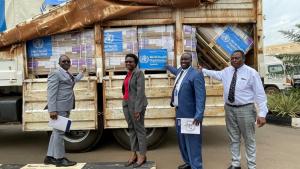WHO Strengthens Uganda's Efforts to Address the Health Impact of Drought and Food Insecurity in the Country
Kampala - World Health Organization (WHO) has provided in-kind contributions of medical supplies worth 1,123,672 (equivalent to UGX 4.1 billion) to the Ministry of Health to address the health consequences of the drought and food insecurity affecting more than 19 districts in Karamoja, Lango and Teso regions of Uganda.
The medical supplies were handed over to the Minister of Health, Dr Jane Ruth Aceng, at the Ministry's headquarters in Wandegeya, by the WHO Incident Manager, Dr Charles Njuguna, on behalf of the WHO Representative in Uganda, Dr Yonas Tegegn Woldemariam.
The medical supplies handed over include drugs and diagnostic reagents for malaria, tuberculosis (TB), cholera, yellow fever, measles, meningitis and sexually transmitted infections, among others.
Dr Aceng expressed gratitude for WHO's contribution to managing health emergencies and improving public health in Uganda.
"Beyond the Ebola outbreak, there are other health emergencies that threaten the lives of our people. I welcome WHO's support as it will help strengthen the fight against the impact of drought and food insecurity in the country," said Dr Aceng.
"This donation aims to ensure the continuity of essential health services, including malaria, maternal, newborn and child health, nutrition, tuberculosis and HIV, at the health facility and community levels, while addressing malnutrition among the vulnerable," said Dr Njuguna.
Over the past three years, north-eastern Uganda (Karomoja, Teso and Lango) has faced several public health challenges due to drought, with Moroto, Kaabong and Karenga districts being the most affected. These challenges include food insecurity leading to malnutrition and disease outbreaks.
A survey conducted in April 2022 revealed that 6% of households in Karamoja were severely food insecure, while 52% were moderately food insecure. Projections of the acute malnutrition situation show that the situation is expected to deteriorate further in some districts.
In response to this crisis, WHO mobilized internal financial, technical and operational resources to address the drought emergency. Medical supplies to the Ministry of Health are part of the support provided to respond to the emergency.
In collaboration with the Government of Uganda, WHO also supported the Ministry of Health in finalizing the crisis response plan, conducted training for leaders in the affected areas to raise awareness of the magnitude of the crisis, strengthened the capacity of rapid response teams and trained 146 health workers in the integrated management of acute malnutrition.
In addition, WHO supported the country in developing a food insecurity response plan, provided personal protective equipment and technical assistance in recruiting rapid response teams to support the affected areas.
